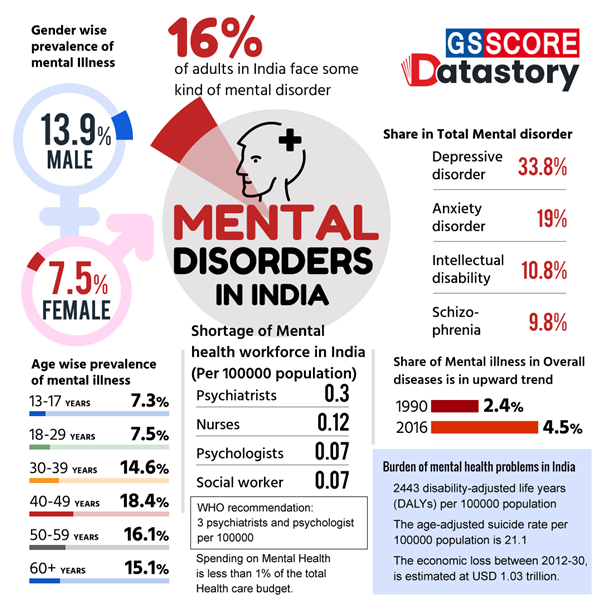

Context
The National Human Rights Commission (NHRC) in a report flagged the “inhuman and deplorable” conditionof all 46 government-run mental healthcare institutions across the country; out of which three are run by the Union government and the remaining by State governments.
About
Important issues highlighted in the Report
- The facilities are “illegally” keeping patients long after their recovery, in what is an “infringement of the human rights of mentally ill patients”.
- Moreover, the perennial shortage of doctors, lack of infrastructure, and proper amenities speak of a “very pathetic and inhuman handling by different stakeholders”.
- The human rights body’s observations were made after visits to all operational government facilities, to assess the implementation of the Mental Healthcare Act, 2017(MHA).
What does the Mental Healthcare Act, 2017 say?
- Mental healthcare in India is governed by the Mental Healthcare Act, 2017 (MHA).
- It was enacted after India ratified the United Nations Convention on Rights of Persons with Disabilities, 2006.
- MHA, 2017 replaced the Mental Healthcare Act, 1987, which did not provide for rightsof mentally ill persons and instead prioritised institutionalisation of mentally ill persons.
- The 1987 Act also necessitated stringent and arbitrary licensing requirements for psychiatrists.
- MHA, 2017, emphasises the rights of mentally ill persons.
- Its preamble states that it is “An Act to provide for mental healthcare and services for persons with mental illness and to protect, promote and fulfil the rights of such persons during delivery of mental healthcare and services and for matters connected therewith or incidental ”
- It empowers persons with mentally illnesses (PMIs) to decide the mode and method of their treatment, provided that they can comprehend the information provided to them.
How long-term institutionalisation violates rights?
- Long-term institutionalisation not only violates Article 21 of the Constitution which protects personal liberty, but also indicates a “failure of the State Government(s) to discharge the obligation under various international Covenants [such as the United Nations Convention]relating to rights of persons with disabilities which have been ratified by India,”.

Important Government Initiatives dealing with ‘Mental Health’
- National Mental Health Programme (NMHP): Aim to be implemented in 704 districts for which support is provided to States/UTs through the National Health Mission.
- Community Health Centre (CHC) and Primary Health Centre (PHC) levels were established to address outpatient services, assessment, counselling/ psycho-social interventions, continuing care and support to persons with severe mental disorders, drugs, outreach services, ambulance services etc.
- National Tele Mental Health Programme: In Budget (2022-2023), India's Finance Minister announced the programme to improve access to quality mental health counselling and also care services.
- T-MANAS (Tele-Mental Health Assistance and Nationally Actionable Plan through States) aims to provide mental health support and interventions to people in remote and neglected areas.
- KIRAN: The Ministry of Social Justice and Empowerment has launched a 24/7 toll-free helpline to provide support to people facing anxiety, stress, depression, suicidal thoughts, and other mental health concerns.
- Manodarpan Initiative: It is an initiative of the Ministry of Education under Atmanirbhar Bharat Abhiyan. It is aimed to provide psychosocial support to students, family members, and teachers for their mental health and well-being during the times of Covid-19.
|
Madhya Pradesh is the first State in the country to draft a suicide prevention strategy and the government has formed a task force for it. |


